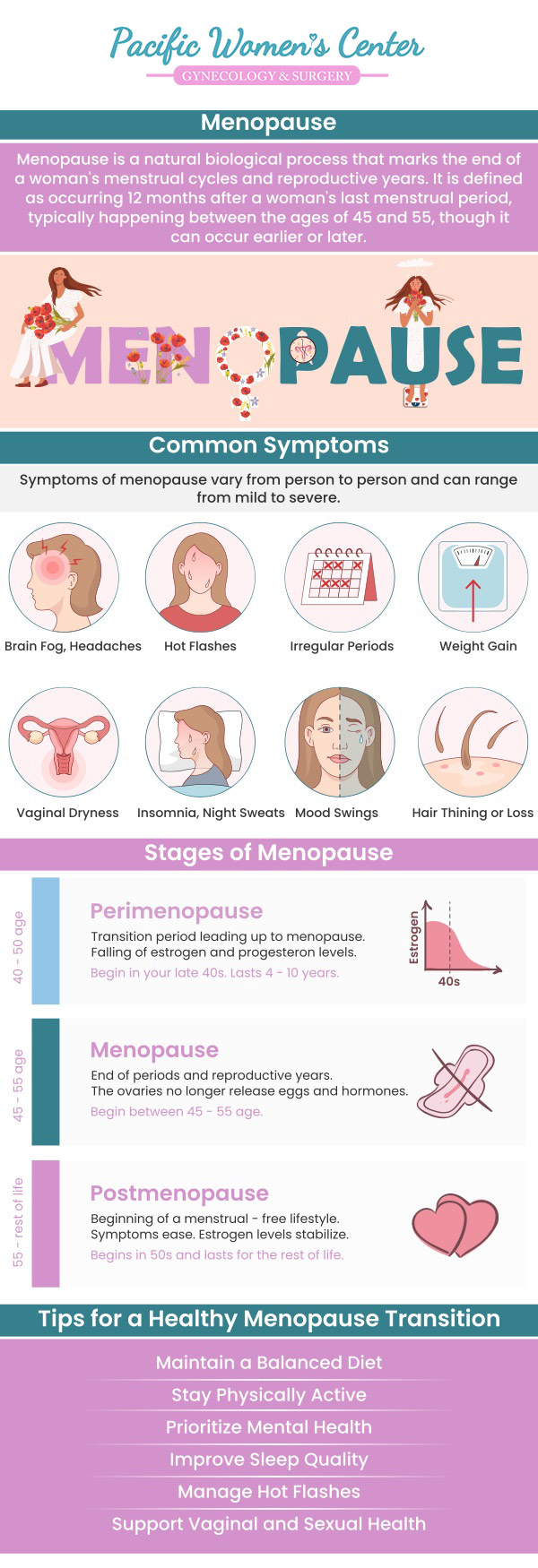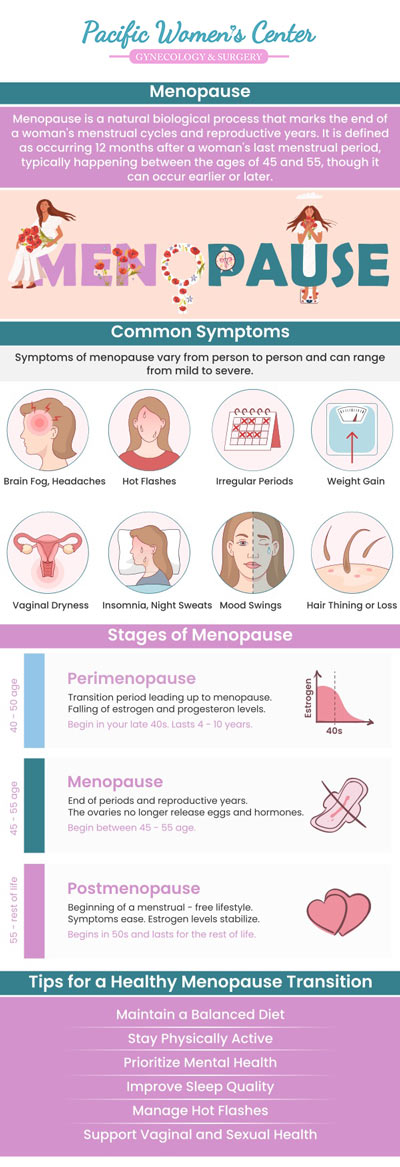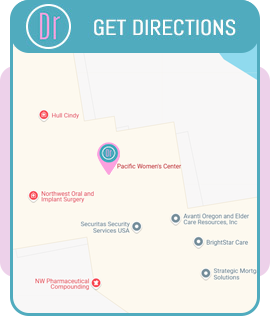Common Symptoms of Menopause and How to Manage Them
At Pacific Women’s Center, our team, led by Dr. Richard A. Beyerlein and Dr. Tamara A. Stenshoel, is dedicated to helping you manage the common symptoms of menopause. We understand the challenges of navigating hot flashes, night sweats, mood swings, and sleep disturbances. Our personalized approach includes a thorough evaluation to identify the specific symptoms affecting your life, followed by a discussion of various management options. For more information, contact us or schedule an appointment online. We are located at 911 Country Club Rd. Suite 222 Eugene, OR 97401.


Table of Contents:
What are the most common symptoms of menopause?
How can hot flashes be managed during menopause?
How can I improve my sleep during menopause?
What are mood swings during menopause, and how can they be managed?
At Pacific Women’s Center, we understand that menopause is a significant transition in a woman’s life. Menopause marks the end of your reproductive years and is accompanied by a variety of physical and emotional changes due to shifting hormone levels. Our experienced providers are here to guide and support you through this stage, offering compassionate care tailored to your individual needs.
The most common symptom women experience during menopause is hot flashes—sudden waves of warmth, often most intense over the face, neck, and chest. Night sweats, or episodes of excessive sweating during sleep, can also disrupt your rest. You may notice your periods becoming less predictable before they stop altogether, a normal hallmark of this transition.
Many women seek our help for mood changes, such as increased irritability, anxiety, or depression, which are often related to hormonal fluctuations and sleep disturbances. Sleep problems themselves are common, with difficulty falling asleep or staying asleep affecting quality of life for many women. As estrogen levels decline, vaginal dryness can develop, sometimes leading to discomfort during intercourse or a higher risk of urinary tract infections.
Other symptoms you may experience include a decrease in libido, trouble with concentration or memory, as well as changes in your body, such as weight gain or thinning hair. While every woman’s menopause journey is unique, these are among the most common concerns we address at Pacific Women’s Center.
Hot flashes are among the most common symptoms experienced during menopause, but with the right approach, they can be managed effectively to improve comfort and quality of life. At Pacific Women’s Center, we are dedicated to supporting women through every stage of menopause, offering personalized guidance and treatment options.
Our providers often recommend starting with simple lifestyle adjustments. Wearing lightweight, breathable clothing and dressing in layers can help you stay comfortable throughout the day. We also suggest keeping your bedroom cool at night, using fans, and drinking cold water when a hot flash begins. Identifying and avoiding common triggers—such as spicy foods, caffeine, alcohol, and stress—can reduce the frequency and intensity of hot flashes for many women.
Regular physical activity, like walking, yoga, or swimming, can help regulate your body temperature and may decrease the severity of symptoms over time. Practicing relaxation techniques, including deep breathing, meditation, or mindfulness, can also help manage daily stress and may lessen hot flashes.
For women whose symptoms significantly impact their daily lives, Pacific Women’s Center offers a range of medical treatment options. Hormone replacement therapy (HRT) remains the most effective treatment for many women, but it may not be suitable for everyone. Our experienced healthcare providers will review your health history and discuss whether HRT is right for you. We also offer non-hormonal prescription medications, such as certain antidepressants or medications used for nerve pain, which can provide relief for some patients.
At Pacific Women’s Center, we understand that menopause brings unique challenges—especially when it comes to getting a good night’s sleep. Symptoms like hot flashes, night sweats, and mood changes can make restful sleep difficult, but there are effective strategies that may help.
Going to bed and waking up at the same time each day helps regulate your body’s internal clock, making it easier to fall and stay asleep. We encourage our patients to create a relaxing bedtime routine, such as reading or listening to calming music.
If you’re experiencing night sweats or hot flashes, keep your bedroom cool. Use lightweight bedding, wear breathable pajamas, and consider a fan or air conditioner to maintain a comfortable temperature.
Deep breathing, meditation, or gentle stretching in the evening can calm the mind and body. Our providers at Pacific Women’s Center often recommend these approaches to help ease the transition into sleep.
Limiting caffeine, alcohol, and heavy meals in the evening can reduce sleep disturbances. Regular physical activity is also beneficial, but it’s best to finish vigorous exercise several hours before bedtime.
If menopause symptoms are disrupting your sleep, our team at Pacific Women’s Center is here to help. We can discuss treatment options tailored to your needs, including hormone therapy, non-hormonal medications, or supplements. Cognitive behavioral therapy for insomnia (CBT-I) is another evidence-based approach we may recommend.
Mood swings during menopause are sudden and often intense fluctuations in emotional state that many women experience as they transition through this stage of life. These changes can include feelings of irritability, sadness, anxiety, or even unexplained anger, and may occur without an obvious trigger. The primary cause of mood swings during menopause is shifting hormone levels, particularly the decline in estrogen and progesterone, which can impact neurotransmitters in the brain that regulate mood. Other factors such as sleep disturbances, hot flashes, and midlife stressors can also contribute to these emotional ups and downs.
We understand that mood swings can be one of the most challenging aspects of menopause. Our experienced providers are dedicated to supporting you through every stage of this transition. We offer comprehensive care tailored to your unique needs, whether you’re seeking guidance on lifestyle adjustments, looking for emotional support, or considering medical interventions.
Managing mood swings often involves a combination of lifestyle changes, self-care, and, in some cases, medical treatment. Our team can help you develop a personalized plan that may include:
– Recommendations for regular physical activity to help stabilize mood and reduce stress
– Guidance on maintaining a healthy diet and good sleep habits
– Techniques for relaxation, such as deep breathing, yoga, or meditation
– Advice on limiting alcohol and caffeine intake
We also recognize the importance of emotional support. Pacific Women’s Center offers resources and referrals for counseling or support groups that can provide comfort and understanding during this time. For more information, contact us or schedule an appointment online. We are located at 911 Country Club Rd. Suite 222 Eugene, OR 97401. We serve patients from Eugene OR, Springfield OR, Coburg OR, Creswell OR, Cottage Grove OR, Lowell OR, Junction City OR, and surrounding areas.

ADDITIONAL SERVICES YOU MAY NEED
❱ Abdominal Hysterectomy
❱ Bladder Lift Surgeon Q&A
❱ Cervical Cone Biopsy
❱ Colposcopy
❱ Endometrial Ablation
❱ Endometrial Biopsy
❱ Female Sexual Dysfunction
❱ Gynecological Surgery
❱ Gynecology
❱ Hormone Therapy
❱ Vaginal Hysterectomy
❱ Endometriosis Diagnosis & Care



